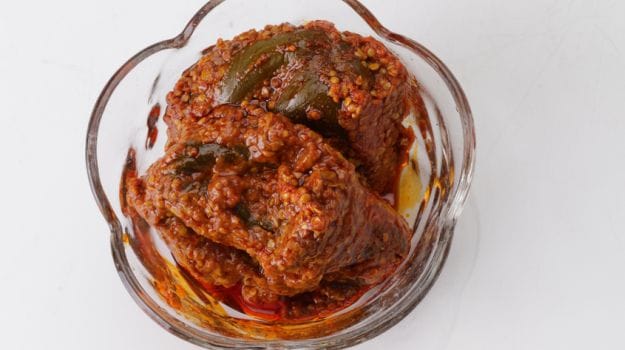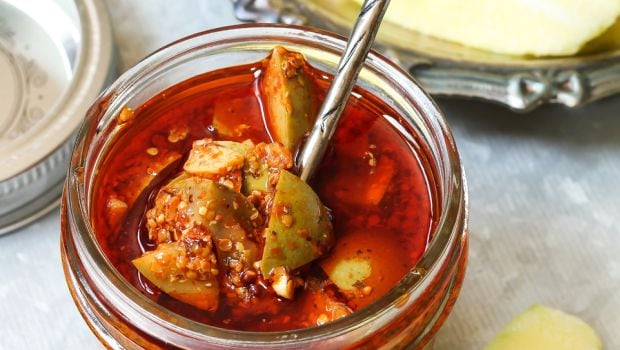To Indians nothing is as dear and reassuring as a home-made pickle. Whichever part of the world you may be residing in, pickles tend to give you a homely essence in your food. A devouring combination is dal and chawal with a dash of ghar ka achaar. It is way better and appetising than any other food in the world. Do you remember those long train journeys where our mothers would serve us a plateful of poori aloo and achaar? This is another favourite combination, along with hot parathas, dahi and achaar. Besides being a lip-smacking accompaniment to our meals, the process of pickling also helps us preserve the best flavours of a particular season, which can then be relished throughout the year.Looking Back: History of PicklingIt is not clear as to when did Indian pickles actually originate, but it is well connected to the ancient art of preserving food with oil, salt and sugar. Back then, there were no ways to refrigerate food to save it from rotting; therefore, the technique of natural fermentation was discovered. This discovery came with the ancient civilisations who kept perishable foods in the sun or cured them with salt and brine (solution of salt in water) to increase their longevity. It is believed that cucumbers were the first food to be pickled in the Tigris valley of India.
Eventually, the concept of pickling became known to many countries and different names were given to this concept, like Germans have Sauerkraut or sour pickled cabbage, Morocco prepares preserved lemons, South Koreans make kimchi that is prepared using cabbage, etc.

What Does Pickling Include?Indian pickling follows the process of fermentation. Vegetables or fruits are dried in the sun, cured with salt, smeared with masalas and oil and stored in airtight containers to avoid letting moisture in. The heat helps the vegetables and fruits to produce by-products like carbon dioxide, acetic acid and lactic acid. The acids that are produced act as a natural preservative and prevent the pickle from going rancid due to growth of pathogenic bacteria for a long time. The direct sun is responsible to provide enough warmth required for the bacteria to ferment the substance. It takes about 15-20 days to complete the process.Why Shouldn’t You Put a Wet Spoon in the Pickle?According to our expert nutritionist, Dr. Shilpa Arora, “you shouldn’t let pickles be exposed to moisture as it makes them go rancid or form fungus on the surface layer of the pickle. Pickle has a long shelf life because of the presence of high amounts of sodium and oil, which help in preserving the food for a longer time. To maintain this, you must keep it in an air-tight container, and expose it to direct sunlight to let it ferment properly. If you let moisture in the pickle, it will get spoilt.”
 Here are a few reasons that you would want to consider before putting a wet spoon in the pickle jar:
Here are a few reasons that you would want to consider before putting a wet spoon in the pickle jar:
Things to be Kept in Mind While Pickling
Eventually, the concept of pickling became known to many countries and different names were given to this concept, like Germans have Sauerkraut or sour pickled cabbage, Morocco prepares preserved lemons, South Koreans make kimchi that is prepared using cabbage, etc.

What Does Pickling Include?Indian pickling follows the process of fermentation. Vegetables or fruits are dried in the sun, cured with salt, smeared with masalas and oil and stored in airtight containers to avoid letting moisture in. The heat helps the vegetables and fruits to produce by-products like carbon dioxide, acetic acid and lactic acid. The acids that are produced act as a natural preservative and prevent the pickle from going rancid due to growth of pathogenic bacteria for a long time. The direct sun is responsible to provide enough warmth required for the bacteria to ferment the substance. It takes about 15-20 days to complete the process.Why Shouldn’t You Put a Wet Spoon in the Pickle?According to our expert nutritionist, Dr. Shilpa Arora, “you shouldn’t let pickles be exposed to moisture as it makes them go rancid or form fungus on the surface layer of the pickle. Pickle has a long shelf life because of the presence of high amounts of sodium and oil, which help in preserving the food for a longer time. To maintain this, you must keep it in an air-tight container, and expose it to direct sunlight to let it ferment properly. If you let moisture in the pickle, it will get spoilt.”

- Exposed to moisture, pickles can turn rancid and bitter in taste.
- Oil is not water soluble; hence, water destroys the surface of the pickle by not dissolving in the oil.
- It may cause fungus to form on the layer of the pickle, damaging most of the portion.
Things to be Kept in Mind While Pickling
- Always put the pickle in a glass jar so that when you expose it to direct sunlight, the heat gets absorbed easily. This wouldn’t be possible in the case of plastic or steel jars and may not be as healthy.
- Keep it away from moist places. Keep the surroundings dry at room temperature and don’t in anyway let water touch the pickle.
- Keep it in direct sunlight for maximum time possible to let the pickle ferment better.
- If any case there is a formation of fungus or grey matter on the surface of pickle, immediately remove that layer and check for the taste of the layer below. If it tastes sour or bitter, you may have to throw the rest away.
Advertisement









